John Janaro's Blog, page 133
January 28, 2020
Saint Thomas Aquinas: "Burst into Flame"
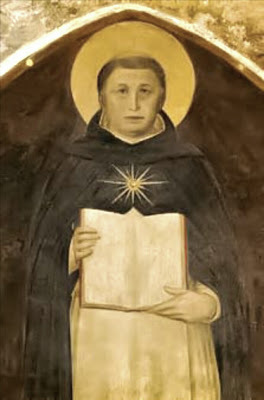 January 28 is the feast of Saint Thomas Aquinas, the great medieval doctor who taught so well about the foundations of all reality - being, knowing, loving - and about the Mystery who created all things, the One who IS, and who is Wisdom and Love.
January 28 is the feast of Saint Thomas Aquinas, the great medieval doctor who taught so well about the foundations of all reality - being, knowing, loving - and about the Mystery who created all things, the One who IS, and who is Wisdom and Love.We honor Thomas as the perennial magister of theology and philosophy, the author of luminous treatises, the poet and mystic, the vindicator of common sense, the guide of deep thinkers, the devoted friar and preacher, the humble soul who found the love of God in Jesus Christ.
"There is no proof of divine charity so clear as that God, the Creator of all things, is made a creature; that Our Lord is become our brother, and that the Son of God is made the Son of man: 'For God so loved the world as to give His only-begotten Son.' Therefore, upon consideration of this our love for God ought to be re-ignited and burst into flame" (Saint Thomas Aquinas, Catechetical Instructions).
Published on January 28, 2020 20:53
January 27, 2020
Goodbye Kobe Bryant
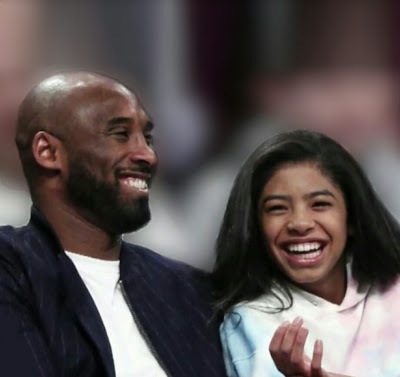 The cursor is blinking at me. I'm just staring at it.
The cursor is blinking at me. I'm just staring at it.... ... ... what can I possibly say about this catastrophe?
Terrible accidents happen every day in the USA and all through the world. Most of them are unnoticed except by those most closely affected. But this accident has made us all pause because of the fame and accomplishments of one of its victims — someone who was also very special to a lot of people.
On Sunday morning, January 26, 2020, a helicopter crashed in the greater Los Angeles area, killing all nine persons on board. There were three 13 year old girls, mothers and fathers, a coach, the pilot ... the disaster abruptly ended the lives of ordinary people and lacerated ordinary families. Spouses and children who didn't happen to go on the helicopter that morning — for what was meant to be a brief, routine trip — suddenly found themselves widowed and orphaned.
Helicopter transit is not a completely unusual way to get around in Southern California, where the urban and suburban traffic is impossibly tangled. Of course, access to a private helicopter presupposes being wealthy, or knowing someone who's wealthy — that is, "wealthy" in terms of the kind of riches that, in the perspective of this tragedy, turn out not to be worth much.
And, in fact, this helicopter had been chartered regularly for many years by a very wealthy man. But it so happened that this man had wealth that was so much more than just money and material things. Indeed, he gave far greater riches to those he inspired over two generations.
Still, Kobe Bryant was only 41 years old. His 20 year legendary basketball career with the Los Angeles Lakers was behind him. But there was so much life ahead, and many people who depended on him.
Above all, there is his family. The youngest of his four daughters was just born this past July 4. He left behind his wife of 19 years, Vanessa, and three of their four girls. And this is where the Bryant family's unimaginable tragedy is multiplied beyond measure: Gianna "Gigi" Bryant, the second oldest of their daughters, was with her father on that fatal Sunday morning flight.
Two other families were also sundered and bereft of parents and children on that day. Indeed, the sudden deaths of nine people have spread around much grief to many loved ones and friends.
In a big world of rapid transportation, this kind of grief comes every day to various people in a multitude of different places. The depth of sorrow for those who are left behind is in each case unique, immeasurable, and deserving of compassion. The shock we all feel over the crash that killed Kobe Bryant, his daughter, and their companions is not because this disaster is somehow "worse" than others. Indeed, the awareness it has generated in us will hopefully enlarge our empathy toward everyone who suffers in the wake of such things.
When someone famous dies, they receive wider attention primarily because they are more widely known. Also, public figures are remembered and honored for their notable achievements, and for the role they played in shaping the lives of others. In our society, excellence in sports is a genuine kind of achievement, and communications technology brings sports competition into view for people all over the world. There is real value in this.
Kobe Bryant was an amazing basketball player. Basketball is played throughout the world today. It is part of the daily life of young people rich and poor alike. It is not surprising, then, that many throughout the world feel something of the impact of his loss. He still had much to contribute to the future of the game and the next generation. Working with his daughter Gigi's basketball league was one of the ways he was doing it.
He loved his family. It breaks my heart what they must be going through. What a tremendous sorrow! My heart goes out to them. I pray for their consolation, and for the other families.
And may God grant eternal rest to Kobe and Gianna Bryant, the other passengers, and all those who depart this life in tragic circumstances such as these. May they rest in peace.
Published on January 27, 2020 20:03
January 25, 2020
The Conversion of Saint Paul

Caravaggio, "Conversion of Saint Paul" (Feast, January 25).
"Christianity is not a new philosophy or a new morality. We are only Christians if we encounter Christ. Of course, he does not show himself to us in this overwhelming, luminous way, as he did to Paul to make him the Apostle to all peoples. But we too can encounter Christ in reading Sacred Scripture, in prayer, in the liturgical life of the Church. We can touch Christ's Heart and feel him touching ours. Only in this personal relationship with Christ, only in this encounter with the Risen One do we truly become Christians. And in this way our reason opens, all Christ's wisdom opens as do all the riches of truth. Therefore let us pray the Lord to illumine us, to grant us an encounter with his presence in our world, and thus to grant us a lively faith, an open heart, and great love for all, which is capable of renewing the world" (Benedict XVI).
Published on January 25, 2020 14:52
January 24, 2020
Saint Francis de Sales
Published on January 24, 2020 20:54
January 22, 2020
The Politics of Respect for the Dignity of Every Human Person

"Human beings are ends in themselves and never a means of resolving other problems."
It is more important than ever that we affirm, with unsentimental clarity of mind, the dignity of the human person — recognizing that this pertains to each individual member of the human species, in any situation and at every stage of development or condition of dependence. This great dignity precludes our ever acting in such a way as to directly intend to kill an innocent human being.
This is a duty and a task entrusted to human freedom, because human individuals never exist in isolation. The bodily dimension of their distinct personhood is always from another — distinct but engendered physically by others — and therefore existing within the givenness of vital person-to-person connections and calling for mutually and communally enriching interpersonal relationships.
This relationship is evident in a direct and fundamental way in the bond between a mother and the child in her womb. She and the child's father have the proximate engendering relationship and therefore the primary responsibility to protect the life and honor the dignity of this person entrusted to them.
This is the basic structure of the human ecosystem: the natural "first" community of the family, which must in turn be upheld, aided, and fostered by still other persons at various levels of proximity: extended and intergenerational family relations, local communities, social and cultural institutions, and the government in its laws and (as needed) its other sustaining resources.
Without the human ecosystem, the connections between persons, between communities, and the span between the generations are unable to take root and flourish. This is a critical problem: the sustenance and development of distinctive peoples, cultures, and civilizations is at risk. The continuation of history is at risk. And we are presently enduring a violent rupture in the human ecosystem.
For many reasons, it has become conceivable (and even celebrated as a "right") for a mother to kill her child in her womb. Often what really happens is that people in power seize upon an isolated, unsupported mother's vulnerability, and manipulate her into thinking that she has to let them kill her child... so that they can make money.
Where is the law? Indeed! Where is it? It is shameful in its absence.
We might also wonder, "Where is the community? true friends? the extended family? the child's father?" Does anyone embrace relationships that are given within the basic experience of being human? How many people, indeed, are irrevocably committed to an interpersonal relationship? Specifically, how many are irrevocably committed to the relationship of man and woman in marriage which establishes them as father and mother in a family? How often are such relationships, in their concreteness, perceived as limits to the individualistic pursuit of power over material things, self-satisfaction, and consumption?
What is going on here?!!
In fact, the conditions for human living are extremely tenuous for persons today in the so-called "developed world." People are thrown far from one another in every direction by the centrifugal forces unleashed by the explosive growth of human material power without a wisdom corresponding to it. Indeed there has been unparalleled development - which is valuable in itself but deeply problematic when it occurs (as it has in the past century and a half) in a wildly unbalanced way.
The materially strongest parts of the world have not seen a corresponding deepening of awareness of what it means to be human, or the urgency of the questions that arise from being human. If anything, the "sense of the human" has atrophied vitally (even as "humanism" has mindlessly latched on everywhere to the mechanics of our discourse). We have not cultivated wisdom. Meanwhile, unthinkable levels of immense power and vast possibilities have been placed in our foolish hands.
As a result, many of us live monstrous lives — perhaps with spectacular external thrills, relentless pursuit of vulgar artificially engendered desires, nervous exhaustion from over-consumption, and an underlying interiority of harrowing loneliness, emptiness, or even zombie-like numbness. Many other people have simply been overrun, pushed to the edge, traumatized, mentally and emotionally damaged, wandering in search of help.
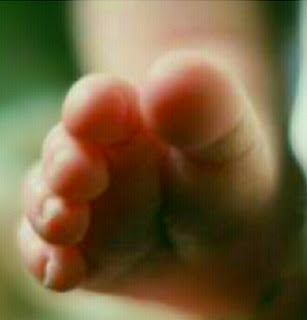 Still, there is hope. Humans are mysteriously resilient. The human person is always something more than material things, and the awakening of the desire for transcendence — for the meaning of things and of their own lives — continues to break through again and again.
Still, there is hope. Humans are mysteriously resilient. The human person is always something more than material things, and the awakening of the desire for transcendence — for the meaning of things and of their own lives — continues to break through again and again.All of this serves to remind us that we are much in need (and people who read my pages know where I think the answer to the ineradicable human questions can be found). Here I only wish to indicate something in a particular category, what I consider to be a political task.
We need to ponder, articulate, and put into action a new kind of wisdom for the enormously powerful world in which we live. We need a practical wisdom — a philosophical and political wisdom — that puts the human person at the center, and that opens space for persons to live the fulfillment of their freedom, to live as persons-in-communion. Such a society will not only protect life, but also honor and respect the dignity of every person. Such a society aspires to be a civilization of love.
People are called to work for this in different ways, according to their gifts and vocation. The work is long and serious, and probably offers little in the nature of the "thrills of the electronic tribe." Such noises, even with their temporary sense of connection, are not likely to bear much fruit. They are too easily co-opted by "the passing whims of the powers that be."
Certainly people should work to change laws. The law must protect the life of the child in the womb and his or her mother (these two precious persons in a mysteriously given, ineradicable relationship), as well as the lives of every human person. But law will have little meaning or permanence unless it is situated within the context of a movement of society toward a real respect for the dignity of every person stemming from the conviction that "a human being is always sacred and inviolable."
How do we become a people who respect the dignity of every person in this tumultuous world? This requires — among many more important, gratuitous openings of hearts — a humble commitment to attaining a deeper "sense of the human," a greater wisdom. We must find ways to cultivate and educate ourselves and the coming generations to a personal maturity that will enable us to find the right bearings in this vast, intense, interconnected, explosive world. We need more than reaction, and more than self-protected instinct-driven belligerent tribalism. We need a renewed discovery of living with intelligence, responsibility, self-discipline, and (a particular challenge) self-limitation.
This last virtue is especially vital to healing the human ecosystem. We are kidding ourselves if we think that we can rediscover the vital sources of human community, human belonging, and the experience of loving and being loved while also continuing to rush after subrational obsessions generated by a monstrous economy of consumption and waste.
We will not "fix" our human problems simply by changing a few laws or reversing a few socially decadent trends, and leaving everything else the same. We will not renew marriage, the family, or community; we will not stop killing children in the womb, neglecting them after they're born, ignoring the poor and the sick, doing violence to one another, abandoning our elders; we will not stop the collapse of the last vestiges of civility and courtesy that become more precarious every day in our communication with each other — we will not succeed in any of these purposes if we continue to enshrine the crass cupidity that amounts to a "practical materialism" as our social ideal. We cannot lust for the possession of material things and also respect human dignity. We will never honor the preciousness of every human person as long as we continue to practice "the idolatry of money."
I say these things as a reminder to myself as much as anyone else. By inclination, I prefer easy solutions. I like the idea of "one big victory" that fixes everything. I like my stuff! I am no better than anyone else. I am part of this problem that is not simple to resolve. I need to be reminded that the challenge of being human is a continual process of personal renovation, and that this new epoch desperately calls for social renovation. With all our flaws and weaknesses, it's still crucial to set our sights on the goal, move toward it, and begin to long for its accomplishment.
In this way, we can pursue a political wisdom that patiently shapes processes and institutions toward the perception of something higher than the rancor of partisan politics driven by the logic of power. Our political culture all too often uses the language of human dignity to dress up its vulgar grasping preoccupations. It swings like a pendulum, now here, now there, wildly unstable. Riding the pendulum and trying to catch something worthwhile as it swings is a perilous venture. I honor the courage of those who try to do it sincerely. There is work here that is far more important than it may appear (and it happens in a realm beyond my competence).
Let us, however, remember wisdom. The ideal of seeking a political order that in some fashion correlates to a real respect, honor, justice, solidarity, and love toward the sacredness of every human person is a goal not to be thrown away lightly, or forgotten in the glow of some temporary change in the "passing whims of the powers that be."
It deserves a foundation that is firm and deep.
Published on January 22, 2020 20:26
January 21, 2020
Saint Agnes and the Recklessness of Love
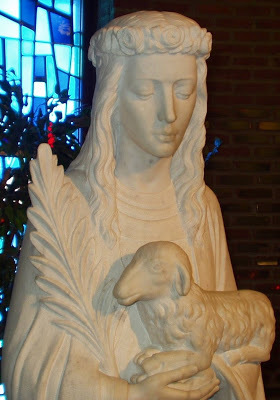 The spirit of the early fourth century martyr St. Agnes of Rome has so pervaded the Christian traditions of religious and consecrated life that we risk taking her foundational witness for granted.
The spirit of the early fourth century martyr St. Agnes of Rome has so pervaded the Christian traditions of religious and consecrated life that we risk taking her foundational witness for granted.This heroic young girl was more than a martyr during the last great persecution of pagan antiquity. Her motive in giving her life for Christ had a special focus: she presented in a personal and also public manner a witness to the mysterious new way of loving that Jesus had made possible for the heart of a woman. "My Lord Jesus Christ has espoused me with his ring; he has crowned me like a bride" proclaims the ancient antiphon.
In another liturgical text, she speaks these words while dying: "What I longed for, I now see; what I hoped for, I now possess; in heaven I am espoused to him whom on earth I loved with all my heart."
Since the days of the New Testament, women had sacrificed the possibility of marriage and motherhood in order to follow Jesus in a deeper way. But St. Agnes gave physiognomy and voice to consecrated virginity as a marriage to Jesus, a singular spousal dedication to him that engages a woman's heart completely, beyond the competition of all human interests and even life itself.
The radiant life and sacrifice of a teenage girl, and no doubt her continual intercession thereafter, have fostered an awareness in the Church of her own deepest life.
"I am espoused to him whom the angels serve; sun and moon stand in wonder at his beauty." There are various stories about St. Agnes, but what is certain above all is the singular ardor with which she embraced martyrdom when it was imposed upon her. The words she speaks in the liturgical tradition are not attributions placed on her lips by some later "theological" development. They are echoed in the fourth century homilies and writings of St. Ambrose, Pope St. Damasus, St. Jerome, St. Augustine, and others. St. Agnus was venerated from the beginning by the clergy and the people of Rome, and then throughout the Western Church and also in the Eastern Churches.
The words she speaks in these ancient liturgical texts bear witness to an extraordinary charism, to a new ideal that transcended the boundaries of every kind of human love and transfigured the openness and intensive affectivity that are at the depths of every woman. The Christian virgin was not like the pagans of Rome or other ancient cultures, when women set themselves apart only for a time, and whose service was something less that a total dedication of the interiority of their persons.
The Christian virgin consecrates herself completely. She reserves that personal secret that women possess in an especially intimate way (her "purity") for Jesus alone and exclusively, body and soul. She dedicates entirely her fruitfulness and nurturing qualities of body and soul to Jesus and the grace he gives through the Holy Spirit.
We must try to appreciate the fact that St. Agnes showed the world a kind of life, a freedom, an originality, a way of giving and loving that were new for human beings, and especially for women, in the long and tired history of the human race. She indicated that women are cherished, ultimately, in a way no one had ever imagined.
She displayed the transcendent passion, creativity, and freedom of belonging to Jesus. St. Ambrose speaks thus of her martyrdom:
As a bride she would not be hastening to join her husband with the same joy she shows as a virgin on her way to punishment, crowned not with flowers but with holiness of life, adorned not with braided hair but with Christ himself. In the midst of tears, she sheds no tears herself. The crowds marvel at her recklessness in throwing away her life untasted, as if she had already lived life to the full.Adorned with Christ himself, she had already lived life to the full....
The witness shines brightly to the fact that for the spouse of Christ, nothing is lost. The sacrifices that are made do not express contempt for the goodness of earthly life, but rather the ecstasy of a love that seeks the Source of all goodness, and thereby finds a hundredfold of fruitfulness even for the life of this earth.
 St. Agnes, a young girl, a virgin, who flew to Jesus all at once in the recklessness of love, lived so fully that her presence and solicitude continue to this day. For seventeen hundred years, women have followed her example and given their whole selves to Jesus, loving him as their Spouse in prayer and seclusion, and also by serving him in those in need.
St. Agnes, a young girl, a virgin, who flew to Jesus all at once in the recklessness of love, lived so fully that her presence and solicitude continue to this day. For seventeen hundred years, women have followed her example and given their whole selves to Jesus, loving him as their Spouse in prayer and seclusion, and also by serving him in those in need.We call them nuns and sisters. We even call them "mothers." Today, more and more, we call them our friends and colleagues too, whether in religious habit or as lay women who consecrate themselves in the context of the many new charisms that the Spirit is giving to the Church of our time.
They have sought God and followed the lamb. And in this giving of themselves, they have been the colossal protagonists, the shining stars of love and hope, the bearers of peace and compassion to this world as well.
Agnes stands as one of the pillars of the greatest "women's movement" of all time, and her witness today remains as compelling as ever. She gave up marriage on this earth and everything else even to life itself. And in Christ she became a true mother to generation after generation of daughters to this day -- of women who want to give themselves away beyond the reckoning of this age, and thus live life to the full.
Published on January 21, 2020 15:29
January 20, 2020
Dr. King: Truth and Love Will Prevail
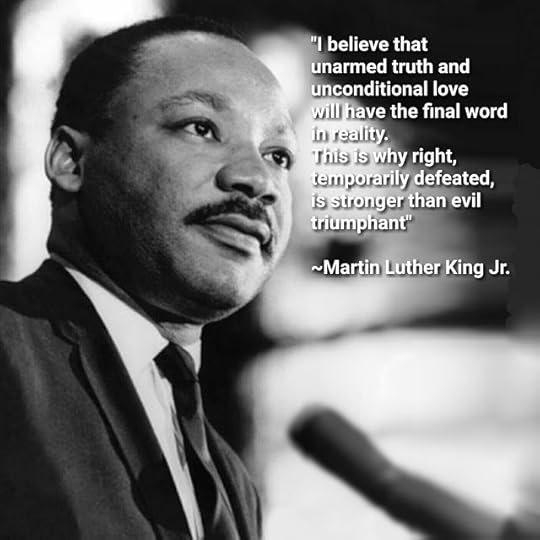
Crucial and compelling words for today: "I believe that unarmed truth and unconditional love will have the final word in reality. This is why right, temporarily defeated, is stronger than evil triumphant" (Martin Luther King Jr).
Published on January 20, 2020 13:32
January 17, 2020
Remembering Neil Peart: Musician, Adventurer, Truth-Seeker

Forty years ago, I was a seventeen year old kid who spent almost all his free time playing the guitar or listening to music. The Canadian rock band Rush pounded through my headphones a lot in those days.
Though I hadn't forgotten my classical roots and continued to play cello in the school orchestra and other ensembles, this was certainly the biggest rocker phase of my life. My friends and I would jam together often and loud. We played what was within reach of our collaborative capacities, and then we admired the music we couldn't play, and tried to learn from it. We certainly admired Rush. Many people couldn't (and still can't) get past the sheer volume and sonic complexity of what these guy put out.
But we loved it. It was terrific music.
When you perceive (aesthetically) the organizing principles of any craft, and appreciate the corresponding skills required to fashion something according to those principles, you "see" the beauty of the work. There is order, proportion, and a level of nobility (analogically speaking) in any successful craft, any work that human beings — who are themselves made in the image of God — achieve as an skillful expression of a concretely "intelligible," creative intuition.
Or, to put it more simple terms, "those dudes could play!"
In fact, those dudes — Alex Lifeson, Geddy Lee, and Neil Peart — "played" together for four decades, and had generations of loyal followers. My son and his friends like Rush a lot. My daughters can't stand them! (This seems to reflect a more general pattern with Rush fans, but... that's another story.)
Right now the musical world is mourning the loss of Rush's drummer and lyricist Neil Peart, who died last week at the (still-too-young) age of 67. This came as a total shock to me and many others: his long battle with brain cancer after his 2015 retirement was not publicly known.
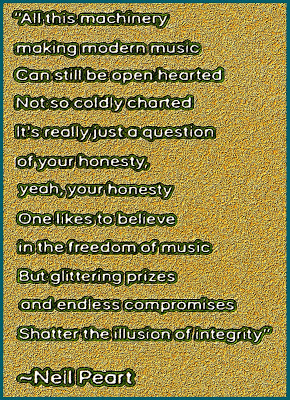 In retrospect, this is not surprising. For a man who makes virtually everyone's short list of greatest-rock-drummers-of-all-time, Peart succeeded in keeping his "private life" out of the spotlight. It helped that he lived without the peculiar drama of celebrity-dom, and therefore failed to draw the attention of those who cater to worshiping outsized celebrity fame and gawking at the human wreckage it all too often brings.
In retrospect, this is not surprising. For a man who makes virtually everyone's short list of greatest-rock-drummers-of-all-time, Peart succeeded in keeping his "private life" out of the spotlight. It helped that he lived without the peculiar drama of celebrity-dom, and therefore failed to draw the attention of those who cater to worshiping outsized celebrity fame and gawking at the human wreckage it all too often brings.That doesn't mean his life was not interesting. Indeed, he shared many facets of his talent, his observations, and the reflections of his restless, searching mind.
Peart was a brilliant musician who redefined the scope of the rhythmic art of the "drummer" (really, he was a percussionist dedicated to continually improving his art). He was one of those players who was constantly surprising us with new sounds, nuances, and techniques in his performance.
He was also an accomplished author whose travel books are vivid chronicles of back roads, small towns, and vast spaces of natural beauty all over North America and other parts of the world. He was an avid motorcyclist who was bold in exploration while also being careful in how he actually handled his bike. He was perceptive, thoughtful, and had much feeling for "local things" — those things that are more and more difficult to find in the now largely homogenized U.S.A. and Canada. He knew how to find those places and appreciate them.
He also searched the cosmos and his own soul in a poignant and sincere way. There is an unusual level of thoughtfulness in Rush's lyrics, but Peart's extensive reading and philosophical turn of mind are even more accessible in his books. Here too he reveals his struggles and vulnerability in processing personal tragedies and suffering, as well as the simple joys and beauties of life.
Peart said that he "believed in the exchange of love." He also had a passion for the dignity of the individual. He did not see how these matters could have a place in a "religious" framework, and he sometimes expressed the Libertarian's distaste for conventional religions and ideas about God. He didn't seem to have much familiarity with the real profundity of religion that can be discovered in some of its specific expressions. Though it must also be admitted that there is a "cheap" side to the way we often talk about religion and God that can be alienating for people who are searching for deeper answers to the provoking questions arising from the mystery of reality and the experiences of joy and pain.
People who identify themselves as atheists or agnostics have an understandable aversion to any notions that seem to them to suggest either a "cosmic Santa Claus" or a "cosmic bully" as the Ultimate Being. Of course, these are distorted images of God, but they still have an all-too-wide circulation. Unfortunately, religious people (myself included) can easily appear to be "conjuring divinity" to escape the challenges of living or to shield ourselves from the awful implacable pain of suffering. Even the articulation of great religious experiences — the powerful testimonies to the truth about God — can pass by, unwittingly making a "bad impression" on someone who (for whatever reason) does not perceive therein the vital proximity of the transcendent mystery of God. We hardly clarify things when we act as if we have God in our pockets, or use Him to justify our prejudices, our partisanship, our own grasping for power.
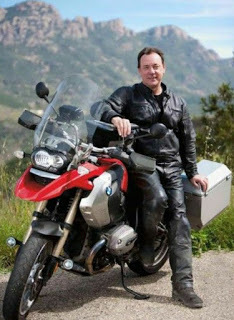 On the occasion of his death, the sincerity of Neil Peart makes me want to examine my conscience on such things, and resolve to accompany the people entrusted to me with greater love.
On the occasion of his death, the sincerity of Neil Peart makes me want to examine my conscience on such things, and resolve to accompany the people entrusted to me with greater love.Even with our best efforts, however, our witness to our faith is imperfect. And though the existence of the Mystery of God can be known by human reason, the practical articulation of this is a bumpy road for actual human beings trying to understand their particular and perplexing lives. Philosophy is worth studying and pursuing, but our actual understanding of even the best philosophy is imperfect, and certainly our particular ways of proposing arguments using complex and potentially confusing terms are imperfect.
Of course, we can only do our best. We speak what we know, as best as we can in circumstances, with passion and vigor certainly — but with the affection of brothers and sisters, not the pride and hostility of ideological partisan combat. We want to remember that each person is on a journey, the depths of which we do not know. We must not judge or condemn anyone, nor should we slavishly endorse what we know is wrong in order to be fashionable or agreeable.
Let's be human instead. The dialogue that will ensue is sure to be fruitful. I wish I could have had that dialogue with Neil Peart. He was a great musician, and in this respect there are few like him. But he was also like many people because he was a sincere man, a thoughtful man, a suffering man. Before such a person I can only stand with respect, appreciation, and humility. And now that his journey is at an end, I pray for him with hope that he will pass into that "exchange of love" that is greater than any of us can imagine.
Published on January 17, 2020 15:37
January 15, 2020
So Much Compassion
Published on January 15, 2020 17:55
January 13, 2020
"Survivor" (A Poem, New and Revised)
 I have reworked and revised large sections of this poem, and it's enough to warrant presenting it here once again. It's not likely that many people read it previously (some two years ago, when it was first posted) — that doesn't bother me; in fact I hope not many people read it, because it was messy.
I have reworked and revised large sections of this poem, and it's enough to warrant presenting it here once again. It's not likely that many people read it previously (some two years ago, when it was first posted) — that doesn't bother me; in fact I hope not many people read it, because it was messy. That doesn't mean it's "neat" now (or ever will be). In any case, I reserve the right to revise it further. This is my "writing workshop" (indeed, my creative workshop for a variety of media). Some of my posts are more polished than others.
After nine years, however, I have also begun to realize that a blog is a distinctive kind of "thing," a literary and multimedia artifact (or collection of artifacts) with an identity of its own, even though I'm not sure what that identity is.
I content for now to consider it a work-in-progress, and keep shaping it as I go.
Here, then, is the new and revised version of Survivor. I have come to realize that this poem, written in the first person, actually does come out of my own experience. In a sense, this poem is about me, but it's also about what is for so many people the intensity and trauma of life in these strange times. We are all the ones who are "running."
As for the ones who drive the runners on, I don't know who "They" are ... [read the poem, and you'll know what I'm talking about
Published on January 13, 2020 20:30






